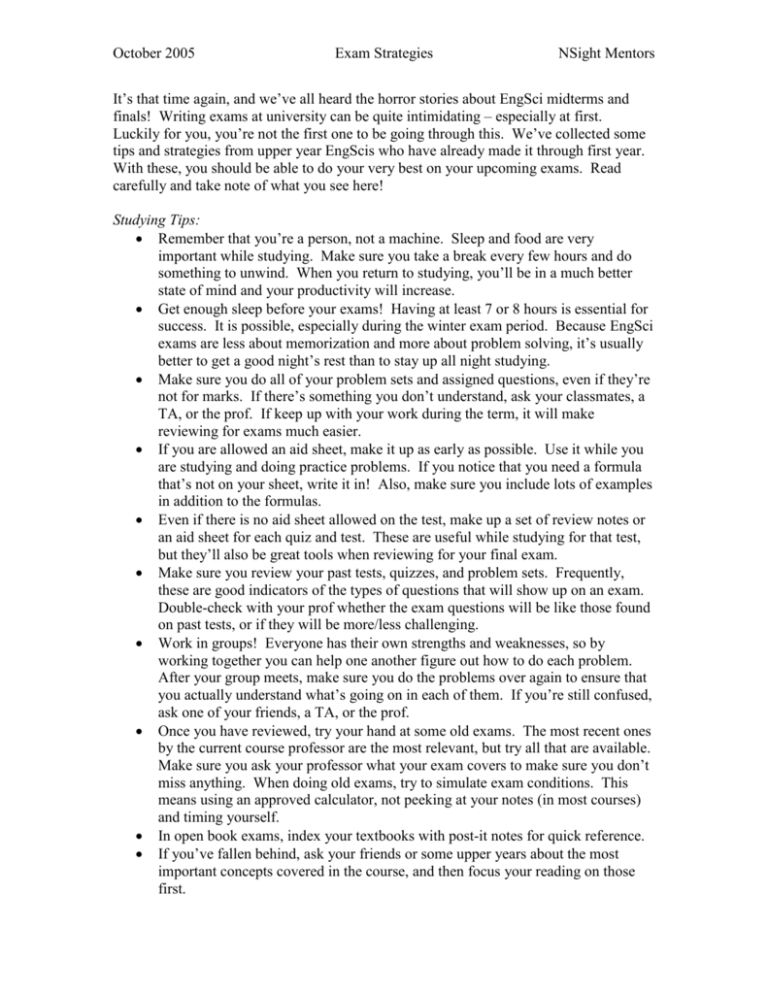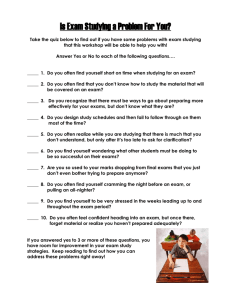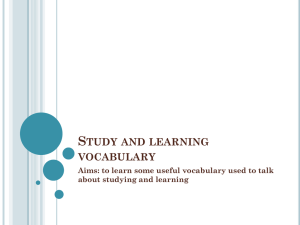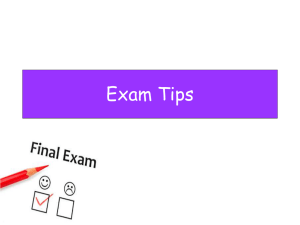Exam Prep
advertisement

October 2005 Exam Strategies NSight Mentors It’s that time again, and we’ve all heard the horror stories about EngSci midterms and finals! Writing exams at university can be quite intimidating – especially at first. Luckily for you, you’re not the first one to be going through this. We’ve collected some tips and strategies from upper year EngScis who have already made it through first year. With these, you should be able to do your very best on your upcoming exams. Read carefully and take note of what you see here! Studying Tips: Remember that you’re a person, not a machine. Sleep and food are very important while studying. Make sure you take a break every few hours and do something to unwind. When you return to studying, you’ll be in a much better state of mind and your productivity will increase. Get enough sleep before your exams! Having at least 7 or 8 hours is essential for success. It is possible, especially during the winter exam period. Because EngSci exams are less about memorization and more about problem solving, it’s usually better to get a good night’s rest than to stay up all night studying. Make sure you do all of your problem sets and assigned questions, even if they’re not for marks. If there’s something you don’t understand, ask your classmates, a TA, or the prof. If keep up with your work during the term, it will make reviewing for exams much easier. If you are allowed an aid sheet, make it up as early as possible. Use it while you are studying and doing practice problems. If you notice that you need a formula that’s not on your sheet, write it in! Also, make sure you include lots of examples in addition to the formulas. Even if there is no aid sheet allowed on the test, make up a set of review notes or an aid sheet for each quiz and test. These are useful while studying for that test, but they’ll also be great tools when reviewing for your final exam. Make sure you review your past tests, quizzes, and problem sets. Frequently, these are good indicators of the types of questions that will show up on an exam. Double-check with your prof whether the exam questions will be like those found on past tests, or if they will be more/less challenging. Work in groups! Everyone has their own strengths and weaknesses, so by working together you can help one another figure out how to do each problem. After your group meets, make sure you do the problems over again to ensure that you actually understand what’s going on in each of them. If you’re still confused, ask one of your friends, a TA, or the prof. Once you have reviewed, try your hand at some old exams. The most recent ones by the current course professor are the most relevant, but try all that are available. Make sure you ask your professor what your exam covers to make sure you don’t miss anything. When doing old exams, try to simulate exam conditions. This means using an approved calculator, not peeking at your notes (in most courses) and timing yourself. In open book exams, index your textbooks with post-it notes for quick reference. If you’ve fallen behind, ask your friends or some upper years about the most important concepts covered in the course, and then focus your reading on those first. October 2005 Exam Strategies NSight Mentors Exam Writing Tips: Don’t frantically look over notes before the exam. Try to relax – deep breathing exercises can help. Look over your exam and do the easy ones first. This will guarantee you marks and gives you confidence. If you find one you can’t do, don’t panic! Skip it, and come back later (just make sure you don’t forget it). Never leave a question completely blank. Even if you’re not sure what’s going on, write down some equations, draw a picture or graph, or jot down some ideas. Hopefully this will help give you ideas about how to proceed. If not, at least you’ll get some part marks. Be as clear as possible and write down all of your reasonsing. Part marks are your friends, as you may not get the right answer on many of the test questions. Look over your paper before handing it in. If time’s almost up and you see a mistake you made, don’t erase everything! Write a note about how you would change it if you had the time and see if you can come up with a correct answer. Don’t finish your exam in a rushed panic! There’s probably not much you can change in the last minute anyway, but if you remain calm you’ll be in a better state of mind when you start reviewing for your next exam. Course Specific Tips: Final Exams CIV102: Past exams are invaluable! They help you predict the kinds of questions you will be asked on the exam. History is also important on this exam, so have all of the dates flagged in your notebook. Alternatively, you may want to make a history summary in the back of your notebook. MAT194: This test is long, so do lots of questions to improve your speed. Devote your time to questions that you can actually do. If you get stuck, move on and come back to the question later. PHY180: Questions may be pulled almost directly out of the textbook or from problem sets. Practice these questions and fill up your aid sheet with as many examples and problems as you can (you can probably fit all of your tutorial problems on it!) CSC180: Practice function tracing, and be as methodical as you can. Pick some code with some weird nestings and functions calls, trace it yourself and run it on the computer to check your answers. Put some generic sorting algorithm variations on your cheat sheet (recursive versions esp..) in case he asks for them or something similar. Conclusion The marks are all belled in the end, so don’t worry! The more relaxed you are, the better you’ll do. Good luck! Resources (for old exams, practice questions) Copywell: 185 College Street Skule website: http://exams.skule.ca/ Engsci Club Website: http://engsci.skule.ca/exams.php




